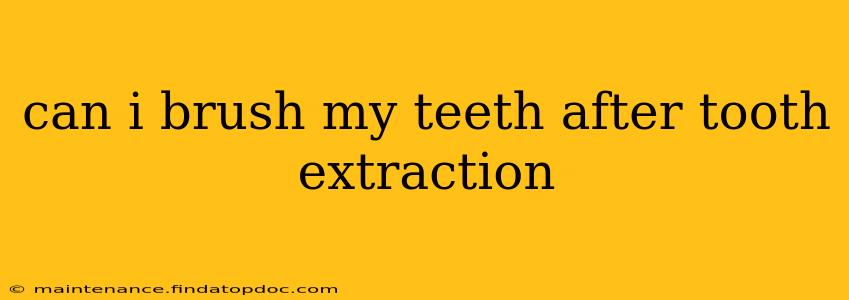Losing a tooth is a significant event, and properly caring for your mouth afterward is crucial for healing and preventing complications. A common question many people have is: Can I brush my teeth after tooth extraction? The answer isn't a simple yes or no. It depends on the specifics of your extraction and your dentist's instructions. This guide will delve into the intricacies of oral hygiene after tooth extraction, addressing common concerns and providing expert advice.
When Can I Brush My Teeth After a Tooth Extraction?
The short answer is: You should wait until the bleeding stops and the blood clot has formed. This usually takes several hours, sometimes even a full day. Rushing the process could dislodge the blood clot, leading to a painful and potentially serious condition called dry socket. Always follow your dentist's specific post-operative instructions. They'll provide personalized guidance based on your individual circumstances.
What Should I Do Immediately After Tooth Extraction?
The initial hours post-extraction are critical. Gently bite down on a gauze pad placed by your dentist to control bleeding. Avoid rinsing, spitting, or touching the extraction site with your tongue or fingers. Rest and elevate your head to minimize swelling. Ice packs applied to your cheek can also help manage discomfort and swelling.
How Long Should I Wait Before Brushing My Teeth After a Tooth Extraction?
Most dentists recommend waiting at least 24 hours before resuming normal brushing. However, some might suggest waiting even longer, depending on the complexity of the extraction. After the initial 24-hour period, you can gently brush your teeth, but avoid the extraction site itself.
How Should I Brush My Teeth After Tooth Extraction?
Once your dentist gives the green light, resume brushing gently and carefully, focusing on the areas surrounding the extraction site. Use a soft-bristled toothbrush and avoid vigorous scrubbing. Gentle circular motions are recommended.
What Type of Toothbrush Should I Use After a Tooth Extraction?
A soft-bristled toothbrush is essential. The softer bristles will help prevent irritation and further trauma to the healing gum tissue. Consider using an extra-soft toothbrush for a few days if your gums feel particularly sensitive.
What About Rinsing My Mouth After Tooth Extraction?
Rinsing is usually discouraged in the first 24-48 hours after extraction to prevent disturbing the blood clot. Your dentist might recommend a saltwater rinse after a couple of days to help with cleaning and healing. Follow their instructions carefully regarding the type of rinse, frequency, and technique.
Can I Use Mouthwash After Tooth Extraction?
Avoid using mouthwash, especially alcohol-based varieties, for at least a week or until your dentist says otherwise. The alcohol can irritate the healing tissues and may even impede the healing process. If you're looking for a way to refresh your breath, gentle rinsing with warm saltwater might suffice.
What If I Develop Dry Socket After Tooth Extraction?
Dry socket, or alveolar osteitis, is a painful complication characterized by the loss of the blood clot from the extraction site. If you experience severe, persistent pain, bad breath, or a visible empty socket, contact your dentist immediately. They can provide treatment to alleviate the pain and promote healing. Recognizing the symptoms promptly and seeking professional care is crucial for effective management.
Conclusion: Prioritize Gentle Care and Communication
Remember, proper oral hygiene after tooth extraction is vital for a successful recovery. Always follow your dentist's specific instructions. Gentle brushing and careful rinsing, after the initial healing period, can help keep your mouth clean and promote healing. Communication with your dentist is key – don't hesitate to call if you have any questions or concerns.
